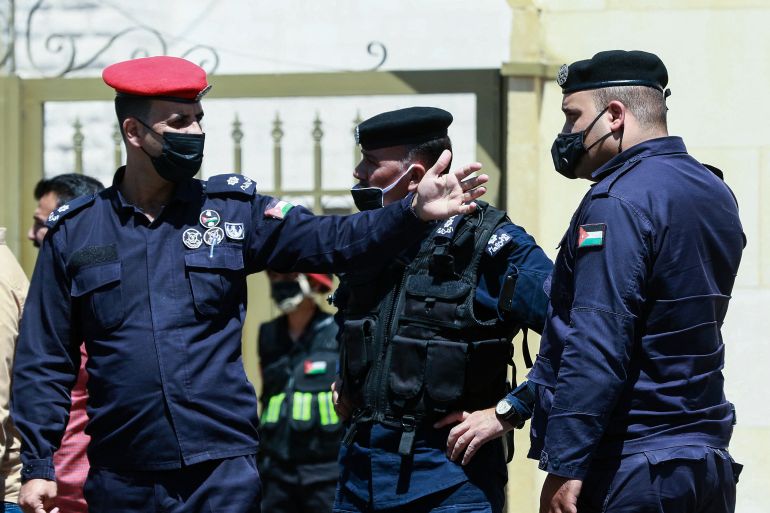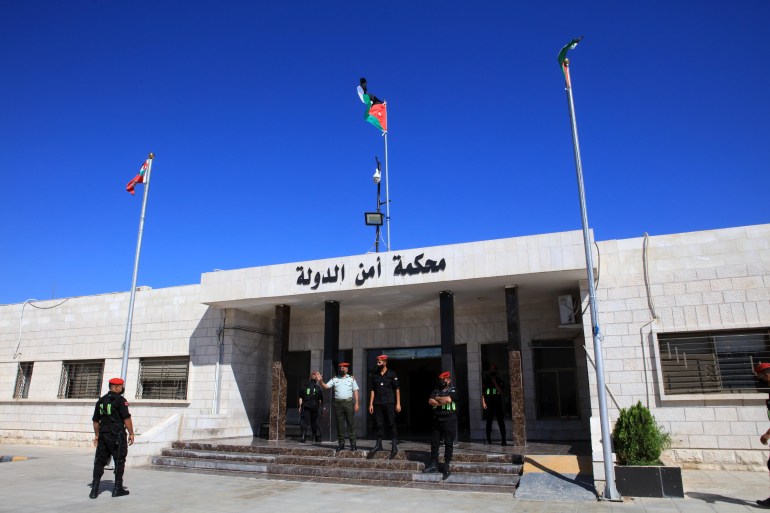Jordan sentences two ex-officials over royal ‘sedition’ plot
Court sentences Bassem Awadallah, Sharif Hassan bin Zaid to 15 years in jail on charges of destabilising the monarchy.

A Jordanian court has sentenced a former royal aide and a minor royal to 15 years in jail on charges of attempting to destabilise the monarchy.
Bassem Awadallah, who has United States citizenship and once served as a top aide to King Abdullah II, and Sharif Hassan bin Zaid, a member of the royal family, were found guilty of sedition and incitement charges on Monday.
The court said it had confirmed evidence backing the charges against the pair and that they had been determined to harm the monarchy by pushing former heir to the throne Prince Hamzah as an alternative to the king.
Bin Zaid was sentenced to another year in prison and 1,000 dinars ($1,400) for drug abuse, Petra news agency reported.

The charges have exposed rifts within the ruling Hashemite family that has been a beacon of stability in a volatile region in recent years.
Awadallah, a former finance minister who was a driving force behind Jordan’s liberal economic reforms, was charged with agitating to undermine the political system and committing acts that threaten public security and sowing sedition.
The pair are also alleged to have sought foreign assistance.
They denied the charges, and Alaa al-Khasawneh, a lawyer for Sharif, said they would appeal the verdict.
‘Personal ambition’
Hamzah is a popular figure in Jordan. He is seen as religious and modest, in touch with the common people and similar to his beloved father, the late King Hussein. He has criticised the government in the past, accusing officials of “failed management” after they approved an income tax law in 2018.
In a clashing narrative, he is also seen as a disgruntled royal who never forgave King Abdullah for taking away his title of the crown prince in 2004 and giving it to his eldest son.
His popularity stems from ties he has nurtured with Jordan’s tribes, the bedrock of Hashemite rule.
The estranged prince avoided punishment last April after pledging allegiance to the king, defusing a crisis that had led to his house arrest.
In a series of video statements, he said he was being silenced for speaking out against corruption and poor governance by the ruling system.
While the former crown prince himself was not on trial, the 13-page charge sheet said Hamzah, 41, “was determined to fulfil his personal ambition to rule, in violation of the Hashemite constitution and customs”.
Lt-Col Muwafaq al-Masaeed, a military judge, announced the verdict following a closed-door trial that consisted of just six hearings.
Before the verdict was announced, Michael Sullivan, a former federal prosecutor hired by Awadallah’s US-based family, told The Associated Press that the trial was “completely unfair”.
Awadallah says he has been beaten, tortured and threatened with future mistreatment “if he didn’t confess”, Sullivan said.
Allegations of foreign assistance
Fares Braizat, chairman of political think-tank Nama-Strategic Intelligence Solutions, said this is the “highest maximum penalty” for the charges they were accused of.
“The case will depend on further ramifications,” Braizat told Al Jazeera. “I’m not sure if there is a legal procedure they can follow with the state security court, but I think the charges they received would bring a lot of satisfaction to public opinion.”
In the days leading up to the trial, the alleged conspirators sought foreign assistance to exploit the king’s perceived vulnerability at a time when he was under pressure from the United States and Saudi Arabia to accept a now-defunct Trump administration Middle East plan.
Jordan has expressed concern the plan would weaken the monarch’s historical role as guardian of key Muslim and Christian sites in occupied East Jerusalem and a pillar of Hashemite claims to legitimacy.
Allegations about foreign outreach focus on Awadallah, who holds Jordanian, US and Saudi citizenship, and once served as the king’s official envoy to Riyadh. He has close ties to Saudi Arabia’s powerful Crown Prince Mohammed bin Salman.
“I haven’t really seen such a figure disliked this much by Jordanians over the past 15, 20 years,” Braizat said, referring to Awadallah. “I think this would bring into question why would such an individual … do what he did.”